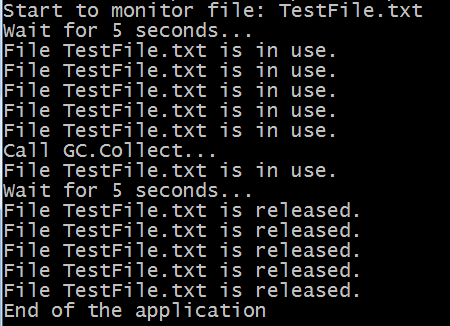.net framework 中的 garbage collection 会帮助程序员自动回收托管资源,这对类库的调用者而言,是个相当惬意的体验:可以在任何位置,任何时候,创建任何对象,gc 最后总是会兜底。易地而处,当自己是类库提供者的时候,则需要如何才能提供这样良好的体验呢?
首先,.Net framework 里面哪些是托管的资源,哪些是非托管的资源?
基本上,在 .Net framework 里面的所有类,都是托管资源,包括各种各样的 stream(例如 FileStream, MemoryStream), database connection, components 等等。。
可以写一个简单的小程序验证:(以 FileStream 为例)
一个方法,在后台线程中监控文件是否正在被占用:
private static void MonitorFileStatus(string fileName)
{
Console.WriteLine("Start to monitor file: {0}", fileName);
Task.Factory.StartNew(() =>
{
while(true)
{
bool isInUse = IsFileInUse(fileName);
string messageFormat = isInUse ? "File {0} is in use." : "File {0} is released.";
Console.WriteLine(messageFormat, fileName);
Thread.Sleep(oneSeconds);
}
});
}
private static bool IsFileInUse(string fileName)
{
bool isInUse = true;
FileStream stream = null;
try
{
stream = File.Open(fileName, FileMode.Append, FileAccess.Write);
isInUse = false;
}
catch
{
}
finally
{
if (stream != null)
{
stream.Dispose();
}
}
return isInUse;
}再写一个占着文件不用的方法, FileStream 只是个局部变量,这个方法返回的时候,它应该被回收:
private static void OpenFile()
{
FileStream stream = File.Open(TestFileName, FileMode.Append, FileAccess.Write);
Wait(fiveSeconds);
}最后是一个必不可少的等待:
private static void Wait(TimeSpan time)
{
Console.WriteLine("Wait for {0} seconds...", time.TotalSeconds);
Thread.Sleep(time);
}合并起来就是一个测试:
首先启动文件监视线程,然后打开文件不用。
OpenFile 方法返回,预测 FileStream 被回收
接着调用 GC, 看文件是否被释放了
private static void FileTest()
{
MonitorFileStatus(TestFileName);
OpenFile();
CallGC();
Wait(fiveSeconds);
}运行结果,可见 GC 自动把 FileStream 自动回收。无须调用 Dispose 方法,也无须使用 using

那么,非托管资源包括哪些呢?
通常,涉及到 windows api 的 pinvoke,各种的 intptr 都是非托管资源。例如,同样是打开文件,如果写成以下的样子,就包括了非托管资源
[Flags]
internal enum OpenFileStyle : uint
{
OF_CANCEL = 0x00000800, // Ignored. For a dialog box with a Cancel button, use OF_PROMPT.
OF_CREATE = 0x00001000, // Creates a new file. If file exists, it is truncated to zero (0) length.
OF_DELETE = 0x00000200, // Deletes a file.
OF_EXIST = 0x00004000, // Opens a file and then closes it. Used to test that a file exists
OF_PARSE = 0x00000100, // Fills the OFSTRUCT structure, but does not do anything else.
OF_PROMPT = 0x00002000, // Displays a dialog box if a requested file does not exist
OF_READ = 0x00000000, // Opens a file for reading only.
OF_READWRITE = 0x00000002, // Opens a file with read/write permissions.
OF_REOPEN = 0x00008000, // Opens a file by using information in the reopen buffer.
// For MS-DOS–based file systems, opens a file with compatibility mode, allows any process on a
// specified computer to open the file any number of times.
// Other efforts to open a file with other sharing modes fail. This flag is mapped to the
// FILE_SHARE_READ|FILE_SHARE_WRITE flags of the CreateFile function.
OF_SHARE_COMPAT = 0x00000000,
// Opens a file without denying read or write access to other processes.
// On MS-DOS-based file systems, if the file has been opened in compatibility mode
// by any other process, the function fails.
// This flag is mapped to the FILE_SHARE_READ|FILE_SHARE_WRITE flags of the CreateFile function.
OF_SHARE_DENY_NONE = 0x00000040,
// Opens a file and denies read access to other processes.
// On MS-DOS-based file systems, if the file has been opened in compatibility mode,
// or for read access by any other process, the function fails.
// This flag is mapped to the FILE_SHARE_WRITE flag of the CreateFile function.
OF_SHARE_DENY_READ = 0x00000030,
// Opens a file and denies write access to other processes.
// On MS-DOS-based file systems, if a file has been opened in compatibility mode,
// or for write access by any other process, the function fails.
// This flag is mapped to the FILE_SHARE_READ flag of the CreateFile function.
OF_SHARE_DENY_WRITE = 0x00000020,
// Opens a file with exclusive mode, and denies both read/write access to other processes.
// If a file has been opened in any other mode for read/write access, even by the current process,
// the function fails.
OF_SHARE_EXCLUSIVE = 0x00000010,
// Verifies that the date and time of a file are the same as when it was opened previously.
// This is useful as an extra check for read-only files.
OF_VERIFY = 0x00000400,
// Opens a file for write access only.
OF_WRITE = 0x00000001
}
[StructLayout(LayoutKind.Sequential)]
internal struct OFSTRUCT
{
public byte cBytes;
public byte fFixedDisc;
public UInt16 nErrCode;
public UInt16 Reserved1;
public UInt16 Reserved2;
[MarshalAs(UnmanagedType.ByValTStr, SizeConst = 128)]
public string szPathName;
}
class WindowsApi
{
[DllImport("kernel32.dll", BestFitMapping = false, ThrowOnUnmappableChar = true)]
internal static extern IntPtr OpenFile([MarshalAs(UnmanagedType.LPStr)]string lpFileName, out OFSTRUCT lpReOpenBuff, OpenFileStyle uStyle);
[DllImport("kernel32.dll", SetLastError = true)]
[ReliabilityContract(Consistency.WillNotCorruptState, Cer.Success)]
[SuppressUnmanagedCodeSecurity]
[return: MarshalAs(UnmanagedType.Bool)]
internal static extern bool CloseHandle(IntPtr hObject);
}处理非托管资源,需要实现 IDisposable interface。原因有两个:

一款非常包包、衣服、鞋子类网站,页面干净清洁、一目了然,mttshop打造精致、简单、易用、免费的商城。 系统要求:IIS5.1以后,必须安装.net 3.5 安装步骤: 1、下载完成后,直接解压文件mttshop.rar 2、附加数据库:解压后的可以找一个叫db的文件夹,解压后直接附加就可以,支持SQL 2000、2005、2008 3、配置web.config文件,找到key=&qu
不能依赖析构函数,因为异构函数的调用由 GC 决定。无法实时释放紧缺的资源。
有一通用的处理原则:析构函数处理托管资源,IDisposable interface 处理托管与非托管资源。
如上述的例子,完成的实现代码如下:
public class UnmanagedFileHolder : IFileHolder, IDisposable
{
private IntPtr _handle;
private string _fileName;
public UnmanagedFileHolder(string fileName)
{
_fileName = fileName;
}
public void OpenFile()
{
Console.WriteLine("Open file with windows api.");
OFSTRUCT info;
_handle = WindowsApi.OpenFile(_fileName, out info, OpenFileStyle.OF_READWRITE);
}
#region IDisposable Support
private bool disposed = false;
protected virtual void Dispose(bool disposing)
{
if (!disposed)
{
if (disposing)
{
// no managed resource
}
WindowsApi.CloseHandle(_handle);
_handle = IntPtr.Zero;
disposed = true;
}
}
~UnmanagedFileHolder()
{
Dispose(false);
}
public void Dispose()
{
Dispose(true);
GC.SuppressFinalize(this);
}
#endregion
}如果同一个类里面既有托管资源,也有非托管资源,那样应该怎么办呢?
可以依照下面的模式:
class HybridPattern : IDisposable
{
private bool _disposed = false;
~HybridPattern()
{
Dispose(false);
}
protected void Dispose(bool disposing)
{
if (_disposed)
{
return;
}
if (disposing)
{
// Code to dispose the managed resources of the class
// internalComponent1.Dispose();
}
// Code to dispose the un-managed resources of the class
// CloseHandle(handle);
// handle = IntPtr.Zero;
_disposed = true;
}
public void Dispose()
{
Dispose(true);
GC.SuppressFinalize(this);
}
}以下为完整的例子,有托管的 FileStream, 以及非托管的 Handler
public class HybridHolder : IFileHolder, IDisposable
{
private string _unmanagedFile;
private string _managedFile;
private IntPtr _handle;
private FileStream _stream;
public HybridHolder(string unmanagedFile, string managedFile)
{
_unmanagedFile = unmanagedFile;
_managedFile = managedFile;
}
public void OpenFile()
{
Console.WriteLine("Open file with windows api.");
OFSTRUCT info;
_handle = WindowsApi.OpenFile(_unmanagedFile, out info, OpenFileStyle.OF_READWRITE);
Console.WriteLine("Open file with .Net libray.");
_stream = File.Open(_managedFile, FileMode.Append, FileAccess.Write);
}
#region IDisposable Support
private bool disposed = false;
protected virtual void Dispose(bool disposing)
{
if (!disposed)
{
//Console.WriteLine("string is null? {0}", _stream == null);
if (disposing && _stream != null)
{
Console.WriteLine("Clean up managed resource.");
_stream.Dispose();
}
Console.WriteLine("Clean up unmanaged resource.");
WindowsApi.CloseHandle(_handle);
_handle = IntPtr.Zero;
disposed = true;
}
}
~HybridHolder()
{
Dispose(false);
}
public void Dispose()
{
Dispose(true);
GC.SuppressFinalize(this);
}
#endregion
}最后,如果是没有实现 IDisposable interface 的类呢? 例如 byte[], StringBuilder
完全不要插手干预它们的回收, GC 做得很好。
尝试过在析构函数中把一个庞大的 byte[] 设置为 null,唯一的结果是导致它的回收被延迟到下一次 GC 周期。
原因也很简单,每一次引用到会导致它的引用树上的计数加一。。
完整代码见 Github:





























